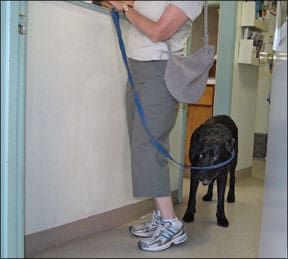We asked several veterinarians who use complementary and/or alternative medicine: “What are the most basic precepts of ‘holistic care’ that dog owners should understand and employ? The points that you want them to absorb if they are to become your regular clients? What dog care practices do you consider to be the bedrock of a vibrant wellness program, and why?”

288
As one might expect from individuals who have explored highly divergent paths in holistic medicine, their answers were idiosyncratic.
Diet and exercise
Ihor Basko, DVM, has been practicing veterinary medicine since 1971. He was an “early adopter” of holistic treatments, using nutritional therapy, Western and traditional Chinese herbs and medicine, acupuncture, massage therapy, laser therapy, and hydrotherapy in his practice. Dr. Basko is also one of the founders and current President of the Veterinary Botanical Medical Association. His practice is located in Hawaii.
There are two dog care practices that Dr. Basko considers the bedrock of a wellness program – a wholesome diet and regular exercise. “The Centers for Disease Control and Prevention has stated that 80 percent of all human life-threatening diseases are due to poor diet and inappropriate exercise,” says Dr. Basko. Dogs, he suggests, are similar.
Dr. Basko’s comments reflect a phenomenon we have observed in many dog owners (not necessarily those who are our readers!): Guardians who are really knowledgeable about their dogs’ diet are the exception, not the rule. When asked whether there is one message he’d like all of his clients to absorb, he says owners should not succumb to laziness or apathy about their dogs’ diets. Owners need to do their homework, he says. “Don’t believe what commercial dog food companies tell you about their products. They have no idea about where the food has originated, nor are they employing any quality control methods to screen for pesticides, heavy metals, and other contaminants in their foods. Begin studying nutrition and how it relates to your particular dog’s breed and condition.” Finally, Dr. Basko echoes another of our strong recommendations: That owners find a good veterinarian. “Find a veterinarian who speaks your ‘language,’” he says. It’s critical that you and your dog’s primary doctor share good, clear communication and shared beliefs to ensure your dog will receive the best care.
Don’t suppress symptoms
Bert H. Brooks, DVM, opened a mixed animal practice in 1980, in Woodland, California. About 10 years ago, Dr. Brooks added the word “holistic” to the name of his practice, currently called Cache Creek Holistic Veterinary Service. Dr. Brooks is also author of the new book More Than A Theory: A New Medical Paradigm. He uses energy from nutritional supplements, herbs, homeopathic medicines, flowers, and frequency generators, and delivers the healing energy remotely by way of the Harmonic Translation System. He also uses muscle response testing.
Dr. Brooks would like dog owners to understand that “holistic care should always address causes of bothersome symptoms and not just suppress symptoms the way conventional allopathic medical practitioners are trained to do.” Even many practitioners who consider themselves to be “holistic” in philosophy still offer only alternative methods of handling symptoms, he says. “I believe the biggest mistake made in medicine today is the use of substances – including natural substances – to eliminate symptoms but which do nothing to address causes. The second biggest mistake is to think the problem is cured because the symptom was suppressed.”
Like many holistic practitioners, Dr. Brooks also considers diet to be an important part of a canine wellness program. However, he’s aware of the difficulties of finding just the right diet for each dog.
“While proper nutrition is undoubtedly the foundation for a healthy life, there exists much debate on the precise definition of ‘proper nutrition.’ Different holistic practitioners have different philosophies concerning this subject, and each opinion is probably valid for a certain portion of the canine population. The reason for this apparent contradiction is that not all dogs need the same nutrition. It is the same problem that commercial dog food companies run into when they try to design ‘the perfect dog food,’ one that contains everything that all dogs need in order to be healthy and lead long lives.
“Each individual dog is unique, and the nutrition for that animal can not be contained in any bag or can which is fit for the consumption of all dogs. Over time, nutritional deficiencies tend to compound before they begin to show up as symptoms. Raw whole foods are philosophically the closest to nature, but some dogs are not tempted by them, and some do not do well on them. The hard part of nutrition is determining what each individual needs.”
Health is dynamic
W. Jean Dodds, DVM, is the founder of Hemopet, the nation’s first nonprofit dog blood bank that also rescues Greyhounds from the racing industry and finds them new homes. Dr. Dodds is renowned for her research on canine vaccines, and on behalf of Hemopet, she consults in clinical pathology nationally and internationally, and regularly travels to teach animal health care professionals, companion animal fanciers, and pet owners on hematology and blood banking, immunology, endocrinology, nutrition, and holistic medicine.
Dr. Dodds considers the concept of “holistic dog care” as wholism, “the original, traditional form of health care that encompasses the whole body and the ambient environment.” In wholism, the sum of the body is more than the sum of its constituent parts, so any treatment that addresses a sole aspect of the dog’s body would be considered incomplete and inadequate. Dr. Dodds cites a number of practices as the foundations of a holistic canine wellness examination. In order for a “holistic veterinarian” to effectively treat a dog, the vet should take a complete family and patient history (medical and environmental), conduct a physical examination, and ask about the dog’s current diet; vaccination and medication history; use of heartworm, flea, and tick preventives; and recent illnesses. The vet should also gain access to any recent laboratory or other diagnostic reports, ordering any needed tests (or repeating tests that weren’t done properly.) Only when all this is taken into account can appropriate treatments be prescribed. Finally, Dr. Dodds says that owners should keep in mind that, “Medicine is an art and a science, and pet health is a dynamic process that changes.” Diet and vaccines Mark Newkirk, VMD, has been in veterinary practice in New Jersey since 1981, offering “complementary medicine,” which he describes as “whatever works best!”
Dr. Newkirk uses herbal therapy, homeopathy, chiropractic, Metabolic Nutritional Balancing, and NAET (an alternative allergy elimination therapy). Dr. Newkirk recently opened a new practice, the Animal Rehabilitation and Sports Medicine Center in Egg Harbor Township, NJ, offering animal chiropractic, physical therapy, an underwater treadmill, therapeutic ultrasound, and neuromuscular electrical stimulation.
When introducing a new client to holistic healthcare, Dr. Newkirk says, he starts by discussing the concept that a dog is a dog. “It’s a carnivore, not a little human! So right away, I talk to them about what the dog’s diet should be – high-protein, with no grains, and no artificial preservatives. I talk about the options available to them: higher-quality dry products, as well as prepared, raw diets. If they are willing to prepare their dogs’ food, we’ll discuss that, but I also let them know about the difficulties involved with balancing the diet, and the importance of feeding the meats raw. I prefer to steer them toward either a holistic dry food or one of the fresh, frozen foods. “The second thing I discuss with them is appropriate vaccination. The vaccination needs of a hunting dog are going to be quite different from those of a toy Poodle living in a highrise. I want to tailor the vaccine program to the individual based on his or her needs. If the dog is older, I talk about vaccine titers, and how it would be best if we could test the dog’s titers so we don’t vaccinate him – overvaccinate him – if he already has sufficient protection. “I’ll go into more detail about nutrition or behavior if this is indicated. I use Metabolic Nutrition Analysis to prescribe specific supplements to correct the imbalances or deficiencies we find in that dog. If the dog is having behavior issues, I’ll talk about behavior concepts – especially if the dog is living in circumstances that don’t suit who he is, like putting that hunting dog into that highrise apartment – and discuss holistic remedies that can help.”
Reconnecting to life Richard Palmquist, DVM, is head of integrative medicine at Centinela Animal Hospital in Inglewood, California. He is the Research Chair of the American Holistic Veterinary Medical Association and uses nutrition, acupuncture, homotoxicology, conventional medicine, and surgery in his practice.
A holistic viewpoint, says Dr. Palmquist, is larger than merely a symptom set seen in a patient. “Holistic care involves the treatment of patients while respecting the connections they have to all components of Life. Holistic approaches seek to connect the patients back with Life and to improve their abilities to use their biological nature in the pursuit of the actions of living.” Different healing tools and modalities are used in holistic veterinary practices as specialized tools. “Acupuncture reconnects and balances Life energy,” explains Dr. Palmquist. “Herbal medicine helps to reduce disease signs, decrease oxidative damage, relieve pain, and promote organ healing. Chiropractic realigns damaged physical parts. Energy medicines such as homeopathy, homotoxicology, Reiki, craniosacral therapy, and others align the physical, mental, and spiritual portions of the organism. Yes, I did say spiritual and that is a big part of holistic medicine – recognizing the spiritual nature of Life.” Western medicine, too, has its place in a holistic practice, says Dr. Palmquist. “It is interesting to note that all medicines capable of assisting a patient in recovery are holistic and that includes drugs, but typically there is a barrier between drug use and holistic medicine out of a belief that these fields are different.”






